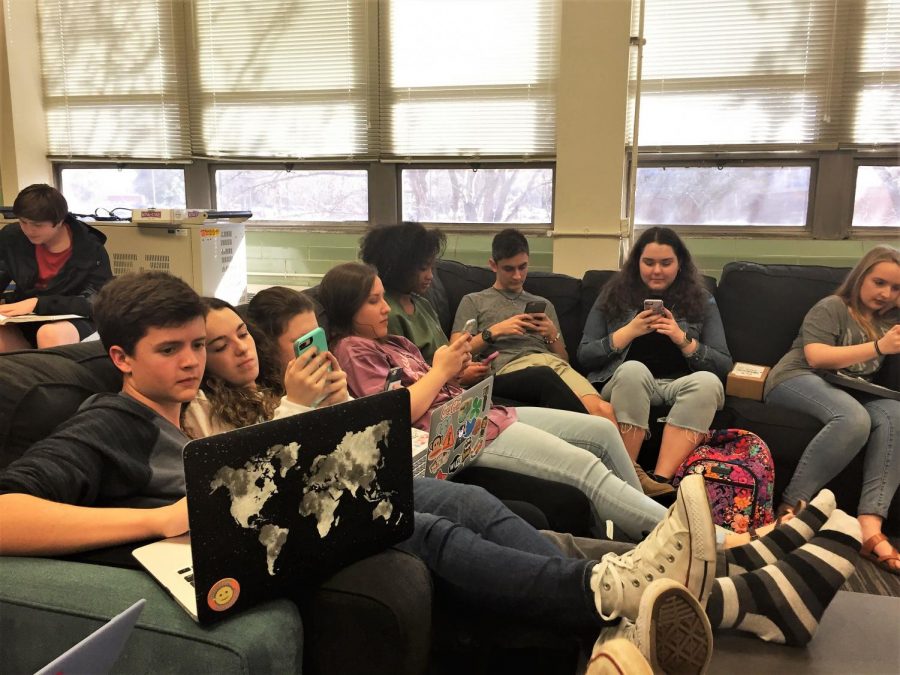Thankachan: Negative Impacts of a Wired World
Students nowadays rely on their laptops and smartphones for communication even more than human interaction. Do they realize that they are being sucked into the world of internet?
February 26, 2018
As students in this age of technological advancements, we tend to interact with our smartphones, tablets and laptops a lot–maybe even more than we do with other people. It is a tough feat to turn a blind eye on the behaviors of other students around me: my classmates scrolling through Facebook, Snapchat and Instagram while eating lunch or crossing the street. It seems as if pressing the “like” button, swiping to the next story or double tapping another’s photo are all second nature to us. But I wonder, do students realize that they are being sucked into another world every time they walk across the road texting or skimp on class time watching the latest updates to their social media accounts? I admit, I too am addicted to my devices.
Modern researchers do not even consider devices nowadays as phones or laptops, instead they see them as tools that portray how technology can manipulate our brains. In fact, they say our phones are almost like an extension of our bodies. There are scientific studies that prove that our dependence on these devices is noticeably palpable; I would go as far as to call it an addiction or disorder. The sounds of little alerts from devices are pleasurable to us because every time we hear a ding or buzz of notification, our brain cells release dopamine, a chemical that makes us feel happy as if we just won the lottery. The high our brains produce by just anticipating the ping sound of notifications can be more pleasurable than the notification itself.
Junior Alexz Carpenter is a student who uses her smartphone and laptop quite often to carry out her responsibilities as a high school student and a Social Media Editor for her school newspaper. While she has been required to incorporate the resources technology provide in her day-to-day life, Carpenter attests to the negative effects constant usage has had on her.
“I feel like students can take advantage of so much technology and focus on things they’re not supposed to. It can badly affect them. It’s very convenient for me having a lot of access to technology that make things easier. I use social media and entertainment apps on my phone. I use my laptop for things such as taking notes, doing research, following along in class to PowerPoints and saving paper while writing reports quickly. I try to will myself to use technology in productive ways, but it can be distracting.”
Too much time on screens can also amp up depression and anxiety. For example, an MSMS student who constantly stays in contact with friends back home might feel nostalgia or anxiety watching the daily moments and hang-outs that the student used to share with people from their hometown. This would make their adjustment to a new residential setting difficult as they grow more aware of the minutes they are not spending with their close friends. Extreme attachment to the lives of others serves as an anchor that prevents the students from exploring new experiences and making new relationships face-to-face instead of through a cellphone.
When I hold my phone, at times my fingers instinctively lead me to social media sites. Scrolling through posts about the achievements of classmates and boasts from their family members may also cause one to lose motivation. It is easy to feel as though you are not doing enough for your own dreams and goals, not working hard enough, not being acknowledged or appreciated enough. Maybe there is not enough done until a post is made about it on social media, all manipulation of our minds.
Carpenter continues, “It can get overwhelming sometimes, especially with social media. Sometimes you can get consumed with what other people are doing. Yes, it helps with communication, but there can be negative effects to it. There’s always so much happening online. I took a break from social media for three months once just to see what that would feel like. It was a great experience. I read a lot and was way more productive. It can also make you a better person because you’re not gossiping about what other people posted online.”
MSMS counselor Dr. Tylon Crook offers his view on device usage among students.
“I think technology offers many benefits, and so I’m all for students using technology whether it be personally or academically within reason. For instance, if you’re using your smartphones to research information for school projects, that is golden. However, you must take the time to turn the thing off at least an hour or so a day so that you can go and get real human interaction, which is where I see deficits come about as a result of people always using devices. What I’ve seen in general, both in students here and amongst adults, is that because people spend so much time with their phones, they’re not honing their interpersonal skills. You don’t see people be able to hold a general conversation and talk about whatever is going on in the world at that particular moment, or if the people are laughing, it’s something on the cellphone as opposed to using critical skills to come up with their own joke or smart comments.”
Crook suggests that life was simplified and less distracting before the boom of cellphones and other devices became a normal, constant extension of young students.
“There were no smartphones when I was growing up. Life back then was simpler. We didn’t have Google or the internet; we had hard-copy encyclopedias. I was a kid who read the encyclopedia. However, we had to get out of the house and make friends with the neighbors. We played and developed audible skills to be successful in other ways as well,” Crook states.
Modern classrooms are considered more advanced if technology is incorporated to instruction; however, students receiving the opportunity to spend more time with their devices only pose temptations to stray from the lesson.
Dr. Philip Benge, MSMS mathematics professor, comments on his observations of students’ interactions with devices in his classroom.
“Mobile devices like laptops and cellphones are great assets in the classroom. Whether students are working on a coding project, playing a game like Kahoot or using Desmos to explore functions, these devices are able to show the beauty of mathematics in a fun, new way. Unfortunately, students often use their devices for decidedly non-academic pursuits like checking text messages and email or using Snapchat. These habits pull the student’s attention away from the subject matter, which makes learning and retention extremely difficult. I think that students need to learn to resist the temptation to check their devices during class, and I encourage students to pay attention by calling on them as soon as I see them peek at their device.”
My argument is not calling for everyone to get rid of their phones and laptops. Of course not. I wouldn’t be able to publish this article without a wired world. I agree that a moderate amount of screen use can be beneficial if used in the right way.
Senior Leah Pettit uses technology to communicate and collaborate with people quickly. Like many students, she uses Excel as her calculator, stored information on her laptop, writes papers, finds solutions to mechanical problems and finds other resources. As a member of the robotics team, Pettit designs her 3D ideas and helps build the team’s robot using both phones and computers. The phones allow her to control the robot remotely while computers were used to write the code.
“I think the technology largely benefits students, as it provides them with access to tools they would never have been able to acquire otherwise. My main clubs are Mu Alpha Theta, Engineering Club, and Linear Algebra Study group. None of the things they do would have been possible without computers. Try learning Finnish without any resources, or 3D-printing a catapult without a computer. Computers and phones provide us access to incredible tools and while they can have negative consequences if used irresponsibly, so can pencils,” Pettit explains.
In this era of technology developing new devices to make our lives easier, I am not arguing that device usage should be stopped completely. I only ask that we become aware of the effects that constant device usage have on our brains and be very thoughtful about how we use our devices. Maybe even consider digital detox once a week for yourself.









